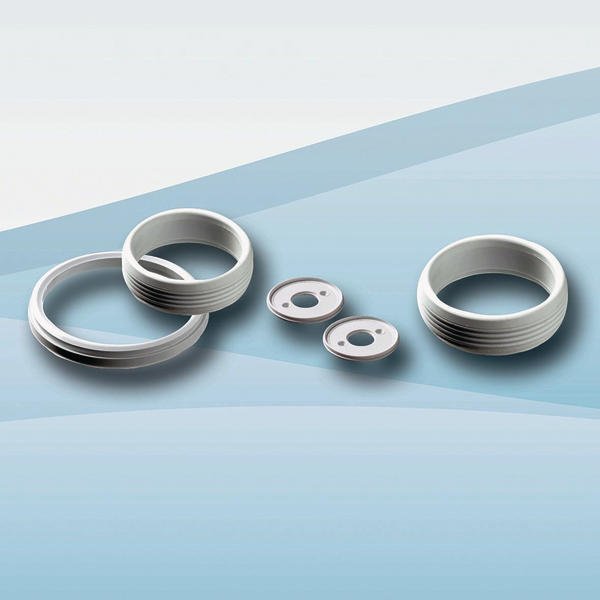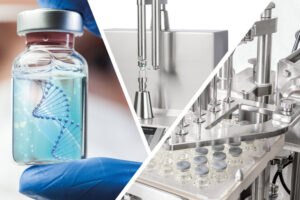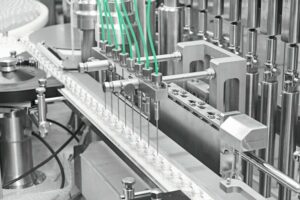Lubricants are used in a wide variety of production line components to reduce friction and wear, and protect machines against corrosion. In food and pharmaceutical manufacturing, a number of specific requirements have to be met. Lube & Seal is an initiative of Freudenberg Process Seals and tribology expert Klüber Lubrication to offer optimally integrated solutions for lubrication and sealing tasks in hygienic processes.
The authors: Christine Riebesell Product Manager, Freudenberg Process Seals Jürgen Fett-Schudnagis Market Manager Rubber and Plastics Industry, Klüber Lubrication Helga Thomas Market Manager Pharmaceutical and Chemical Industries, Klüber Lubrication
From a chemical perspective, sealing elastomers and lubricants belong to different worlds. The task of sealing process plants therefore tends to culminate in a highly complex tribological system. The focus is normally on the effect the lubricant has on the elastomer, with consideration also being given to the process media. Other important aspects include good compatibility, low friction and minimal wear.
From the point of view of R&D or purchasing, seals and lubricants are merely C parts. If, however, the relevance of the tribological system for the function and service life of a production line or its components, e.g. valves, is examined, it becomes obvious that these C parts in fact have an A function.
Two specialists pulling together
Freudenberg Process Seals, a manufacturer of special seals, and Klüber Lubrication, a specialist in the development and manufacture of lubricants, have pooled their respective know-how to provide comprehensive technological expertise. They offer plant, component and machine manufacturers a chance to collabo-rate in the development of integrated tribological solutions with fine-tuned combinations of seal and lubricant from a single source. Lube & Seal provides optimal compatibility of the seal and lubricant, reduced friction and hence minimal wear. The reliability and service life of machines and plants is substantially improved as a result.
Purchasing managers, designers and R&D engineers only have to talk to a single development partner to obtain tested, high-end so-lutions. The service portfolio comprises not only consulting and development but also functional testing in the test lab and on the customer’s equipment along with innovative seal designs and materials and special lubricants.
Light-coloured seal materials
There is a host of laws and regulations (e.g. FDA, EC 1935/2004, USP Class VI) dealing with the requirements to be met by sealing materials used in contact with food, beverages, cosmetics, pharmaceuticals and other products relevant to human health. Elastomers that meet these and other pertinent directives, and as such are suitable for specific products and cleaning procedures, have therefore been developed.
There is a clear trend towards light-coloured sealing materials for sensitive processes where purity is vital. The product most recently developed and launched by Freudenberg is a white EPDM material called 70 EPDM 253815. In the past, soot particles were an indispensable ingredient of elastomers if the material was to be mechanically and chemically stable. This white EPDM, however – although it contains mineral filler materials – boasts characteristics that are no less excellent than those of a comparable black product.
70 EPDM 253815 is ideally suited for seals of hygienic design where stringent approval specifications have to be complied with. The material has already proven its mechanical and chemical resistance in comprehensive tests and been successfully deployed, notably in CIP / SIP processes. It is ADI free and meets the requirements of FDA and EC 1935/2004. It is available in the form of an O-ring or with customer-specific shapes.
Lubricants fit for hygienic requirements
Lubricants for use in the food processing and pharmaceutical industries need to be internationally approved, neutral in taste, odour and colour as well as in good microbiological status. The FDA has created a special H1 category for these products, indicating technically unavoidable product contact. Only substances that are listed in Section FDA 21 CFR 178.3570 may be used in this category. The manufacturing processes employed for making H1 lubricants should likewise be certified by NSF according to the international ISO 21469 stand-ard, to ensure compliance with the strict hygienic requirements of food and pharmaceutical production.
Klüber Lubrication’s synthetic H1 lubricants are characterised by particularly high performance capabilities, enabling lubricant quantities to be reduced to a minimum. Minimum quantity lubrication, combined with precise lubricant metering, additionally supports compliance with hygienic regulations in these key industries.
To cope with the rising cost pressures confronting manufacturers of pharmaceutical prod-ucts, systematically and individually developed concepts are called for. The objective is to increase both the reliability of the processes and the productivity of the production plant by using only a limited number of lubricant types, optimising the relubrication intervals and choosing high-performance H1 lubricants. By reducing the number of lubricant types, creating lubrication charts, extending the relubrication intervals and cutting the costs for energy, it is often possible to bring down manufacturing costs considerably. Furthermore, the consistent use of H1 lubricants leads to more transparency and hence more reliable production processes.
Specific lubricants that are also tested for compatibility with the seal elastomers have been developed by Klüber Lubrication for seal lubrication in the food processing and pharmaceutical industries. Paraliq GTE 703, a special lubricant based on silicone oil and PTFE, is a genuine all-rounder: it is compatible with many different elastomer types, highly resistant to chemicals and approved for drinking water applications over and above its NSF-H1 registration and ISO 21469 certification. Paraliq GTE 703 has additionally been tested for neutrality towards beer froth and is used in beer tapping installations with great success.
Klüber Lubrication offers a comprehensive portfolio of lubricants for valves and fittings that have been tested for compatibility with elastomers, e. g. Klüberfood NH1 87–703 Hyg for sterile applications like aseptic cold filling of bev-erages. A large number of material certifications and approvals are available for these lubricants, depending on the application: H1 registration, ISO 21469 certification, drinking water approval, neutrality towards beer froth, compliance with BSE guideline EMEA/410/01, halal and kosher certifications. Tests on the microbiological status can be conducted on request.
Compatibility test results
The term “elastomer compatibility” refers to the tendency of a lubricant to alter the physical characteristics of elastomer seals with which it is in contact. To test and describe this tendency, static elastomer samples are stored in a glass container filled with the lubricant concerned for a defined time at a defined temperature (DIN ISO 1817). The change in volume, weight and mechanical characteristics is then determined.
When a test of this kind was conducted with Paraliq GTE 703 and 70 EPDM 253815, the mass and volume did not change at all, or only very slightly, over an exposure time of 1000 hours at +100 °C. The change in the mechanical characteristics amounted to approximately 15 %, which is very low. The prod-uct’s high neutrality was, in other words, emphatically confirmed by the test.
Online-Info: www.cpp-net.com/2111439
Free of animal-derived ingredients
Background knowledge
Since it became generally recognised that BSE pathogens – so-called prions – can cause a new variant of Creutzfeldt-Jakob disease in humans, appropriate measures have been taken in the food production sector. As prions, unlike bacteria, are not living organisms but protein molecules that have undergone certain mutations, these pathogens are extremely resistant. It is because of this strong resistance that manufacturers have to prevent the presence of BSE pathogens in food production lines reliably.
This also applies to the materials of seals that are used in such plants. In the past, additives like separating agents containing stearates, solvatation and dispersion agents or fatty acids of both animal and vegetable origin were commonly used. However, only substances that are not extracted from animal products can claim with certainty to be free of BSE pathogens. Freudenberg Process Seals has had its sealing materials reviewed with this in mind and developed special new alternatives that can be proved to be free of animal-derived ingredients. These demonstrably safe sealing materials are marked “ADI free”.
Share:







